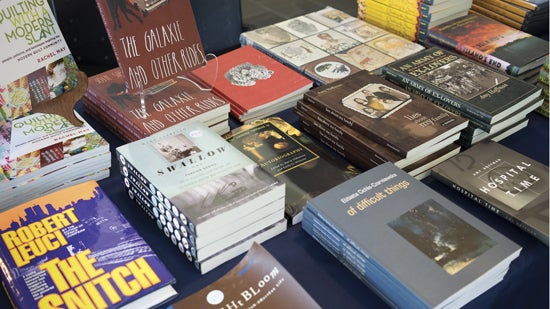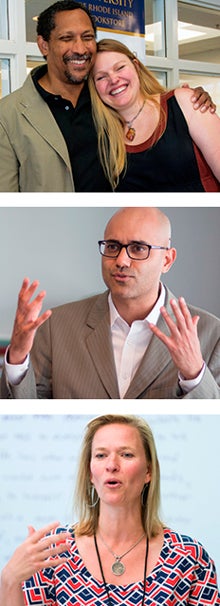Writer to Writer

URI’s Ocean State Summer Writing Conference is a literary gathering like no other.
At the 2014 Ocean State Summer Writing Conference in June, URI English professor Josie Sigler Sibara introduced a keynote speaker. It was her mentor, and the best writer you haven’t read but ought to: novelist, poet, short-story author and professor Percival Everett.

Sibara recounted how, as a Ph.D. student in creative writing and English at the University of Southern California, she started a novel. “I was pretty scared, not only about how I was going to do it, but when I was going to do it,” she told the crowd in Swan Hall’s auditorium. A chance conversation with Everett solved both problems. “When I was trying to figure out what form my novel would take, Percival said: ‘No one even knows what a novel is. That’s the beauty of it. You can just follow yourself in.’ And when I was trying to figure out how I would write it while teaching and writing a dissertation, he said: ‘I just look for little openings in the day. You don’t need some crazy structure to work. You just have to be interested enough in your idea that you’ll want to return to it every chance you have.’”
That was the day, she adds, that, “I went home and became a novelist instead of a short story writer.”
After a warm hug—no air kisses here—Everett approaches the podium. “Thank you for that introduction,” he says to Sibara. “I’ll pay you that five dollars later.”
He turns to the audience. “Students like Josie are the reason I continue to teach,” he says. “She will not be denied.”
That hug, those words, were from mentor to mentee, but also between peers: writer to writer, professor to professor. And between two honored writers, two of this year’s 38 recipients of National Endowment for the Arts fellowships, chosen from more than 1,300 applicants. This was an embrace of literary firepower.
Since the Ocean State Summer Writers’ Conference began in 2007,
it always has boasted a wide array of speakers and workshop leaders, from Lisa Gardner, New York Times bestseller of suspense novels, to National Book Award winner Julia Glass (The Three Junes), to National Book Award finalist, poet Kevin Young. One of Julia Child’s co-authors has attended; several editors every year from presses big and small, plus publicists and agents; newspaper reporters and editors; screenwriters, actors, filmmakers; one year, even a men’s fashion editor from Town & Country magazine.
“What makes our conference unique is that our creative writing faculty have relationships and are able to attract writers who are contemporaries in their field, receiving national recognition for their work,” says conference organizer Michelle Caraccia. For example, Speaker Ayad Akhtar, a Pakistani-American Pulitzer-winning playwright, studied under URI’s Mary Cappello when she was at the University of Rochester. He was 19, she was 27, but they have maintained a relationship since.
Then there’s how conference founder and URI professor Peter Covino invited his longtime friend, poet Richard Blanco, to run the Beginning Poetry workshop in 2012. That fall, President Obama chose Blanco to be the 2013 inaugural poet, placing him in the ranks of Robert Frost and Maya Angelou. Blanco returned to the writing conference as a keynote speaker in 2013 and spoke at URI’s undergraduate commencement this year, receiving an honorary degree.
In fact, the conference can claim a certain prescience when booking speakers. In 2013, for instance, artist Susan Bee received a Guggenheim Fellowship after accepting her invitation to speak. In 2011, one keynote was Jennifer Egan, whose novel A Visit from the Goon Squad won the Pulitzer Prize two months before the conference—well after she was booked.
“I am a huge believer in conferences,” Egan said in her keynote address that year. “Going to conferences like this one was really the way that I learned to write.”
In its eighth year, the program offered 31 presenters and a greater array of workshops and subject matter than ever before for the 2014 sessions.
In addition to more traditional topics such as poetry, fiction, nonfiction and the writers’ marketplace, it held workshops and master classes on screenwriting, plays, science fiction, trance poetry (involving hypnosis!) and its first forays into workshops on graphic arts and young adult literature.
Nowhere is this diversity more evident than among the keynote and featured speakers. Two white male poets, we grant you, but of two different generations and respective relationships to language: Charles Bernstein, a “radical modernist” who began publishing in the 1970s, about when the younger, more lyrical Stephen Burt was born. There were two highly acclaimed novelists—Percival Everett and Amity Gaige—both experimental, but in highly different ways. Alison Bechdel, a lesbian graphic memoirist with 30 years of cartooning behind her, and Akhtar rounded out the group.
What do they share? The freedom to differ in perspective.
Gaige instructs writers to consider this chain of perspectives: the real-life author, the implied author, the narrator, and the reader.
When Everett writes, he says, “I discover the voice of the character and become that character” and doesn’t consider the prospective reader at all.
And this is why 125 writers attended: To learn from vastly disparate ideas and voices, in order to uncover their own.
Ayad Akhtar’s master class feels somewhat formal, efficient.
He asks the attendees to write down questions on paper, and he’ll sort through them and see how many he can answer.
“I expected everyone would have laptops,” Stuart Gamble, a teacher from Westfield, Mass., leans over to confide, “but look, all these pens and notebooks!”
The session drew women in linen and men in khakis and ball caps—predominant groups at the conference—but among them were poets, aspiring playwrights and screenwriters, fiction and nonfiction writers alike. Akhtar discusses Aristotle, Shakespeare, the Qur’an and Star Wars with equal agility and reverence. His advice on getting a script noticed? Don’t merely network, “Surround yourself with the aroma of viability, with people who have it.”
Amity Gaige’s master fiction class on “The Unreliable Narrator” drew young adults and senior citizens, women and men, neophytes and Pulitzer winner Akhtar.
“So, I want you to think of a lie you told,” Gaige instructs the class. “It could have been yesterday, it could have been a long time ago.
“Nothing that’s going to get you arrested,” she cautions with a smile. “When you’ve thought of one, write it down.” Pens and pencils move, some rapidly, some reluctantly. Brows furrow.
When it’s time to share, a woman confesses that the other night, she’d completely forgotten she was going to meet her neighbor in East Greenwich for a drink. “I told her I’d been writing and lost track of time. But I’d just forgotten. And… I wasn’t even writing, I was playing computer games!”
“My husband said I can’t buy any more shoes, I have too many shoes,” said Natalie Tortalani of Warwick. She’s 80. “I say nothing, I buy more shoes. Then when he sees them, he goes, ‘Are those new?’ and I say, ‘Nooo, I’ve had these for years. You see me wear them all the time.’ “
As it turns out, this is an exercise in reliability, and why we lie. Some unreliable narrators are conscious constructs, such as rapper Jay-Z’s personas, as noted by attendee Anita August, a rhetoric professor from Sacred Heart University in Connecticut.
But everyone’s technically an unreliable narrator, Gaige says, because everyone has only one point of view. Whether you’re lying to save face, to hide something you did or didn’t do, we all do it.
“But she—” a student says, pointing to Natalie—“Isn’t she being true to herself, by buying the shoes anyway? It’s like, I have two characters in my book, who take turns telling the same story, and one’s lying and the other isn’t. But you can’t tell which is which.”
“They sound Italian,” Natalie says, and everyone laughs.
The Ocean State Summer Writing Conference is a big component of Creative Writing at URI, but not the only one.
Online summer writing courses dovetail with the conference by including admission—and are often taught by conference faculty. URI is home to prestigious poetry press Barrow Street, and the Ocean State Review, now in its fourth year, features writers from across the country; some have attended or presented at this year’s conference or previous ones. The Read/Write series brings three acclaimed writers to the University and to the public every semester, most recently Afaa Michael Weaver, recipient of the Kingsley-Tufts Prize.
And throughout the academic year undergraduate and graduate students are enrolled in creative writing seminars of multiple genres. “We’re so proud that our graduates go on to teach in MFA programs; and our graduate students are attending conferences, getting real-world experience, and completing incredible and creative projects,” says conference coordinator Thomas Barkman, who holds an MA from URI.
URI’s Cappello adds, “No art happens in a vacuum, and mentoring relationships are essential to the work that we create. In the English Department, we’re really quite devoted to our students. We give them a lot of one-on-one attention and guidance outside of class, as well as opportunities that extend beyond the classroom.
“It’s thrilling when, each semester, students discover, in many cases, for the first time, that they have very real writing abilities. They respond to the rigors of our classes, the in-depth reading and critiquing that we require, and it’s a beautiful thing to watch as they discover their own voices. We graduate truly outstanding creative writers and critical thinkers each year.
“I mention this because the conference is not an isolated annual event. It is directly linked to the unique and exciting curriculum that we have shaped in the Department of English, both at the undergraduate and graduate levels. In effect, it combines community outreach with a deepening of our program offerings. Our students, in other words, also benefit from the conference, and they also help to plan it and orchestrate it.”
—Elaine Beebe
 Home
Home Browse
Browse Close
Close Events
Events Maps
Maps Email
Email Brightspace
Brightspace eCampus
eCampus


